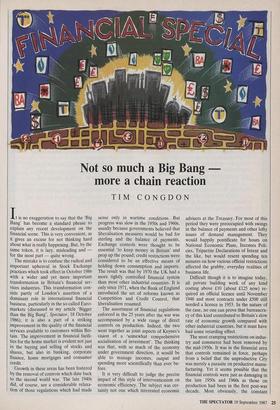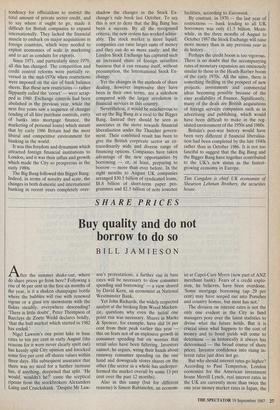Not so much a Big Bang more a chain reaction
TIM CONGDON
It is no exaggeration to say that the 'Big Bang' has become a standard phrase to explain any recent development on the financial scene. This is very convenient, as it gives an excuse for not thinking hard about what is really happening. But, by the same token, it is lazy, misleading and for the most part — quite wrong.
The mistake is to confuse the radical and important upheaval in Stock Exchange practices which took effect in October 1986 with a wider and yet more important transformation in Britain's financial ser- vices industries. This transformation con- sists partly of London's assertion of a dominant role in international financial business, particularly in the so-called Euro- markets (discussed in my article 'Bigger than the Big Bang', Spectator, 18 October 1986); it is also a part of a striking improvement in the quality of the financial services available to customers within Bri- tain. The improvement in financial facili- ties for the home market is evident not just in the buying and selling of stocks and shares, but also in banking, corporate finance, home mortgages and consumer credit.
Growth in these areas has been fostered by the removal of controls which date back to the second world war. The late 1940s did, of course, see a considerable relaxa- tion of those regulations which had made sense only in wartime conditions. But progress was slow in the 1950s and 1960s, usually because governments believed that liberalisation measures would be bad for sterling and the balance of payments. Exchange controls were thought to be essential 'to keep money in Britain' and prop up the pound; credit restrictions were considered to be an effective means of holding down consumption and imports. The result was that by 1970 the UK had a more tightly controlled financial system than most other industrial countries. It is only since 1971, when the Bank of England introduced the set of reforms known as Competition and Credit Control, that liberalisation resumed.
The assortment of financial regulations enforced in the 25 years after the 'war was accompanied by a wide range of direct controls on production. Indeed, the two went together as joint aspects of Keynes's vision of a 'somewhat comprehensive socialisation of investment'. The thinking was that, with so much of the economy under government direction, it would be able to manage incomes, output and spending more scientifically than ever be- fore.
It is very difficult to judge the precise impact of this style of interventionism on economic efficiency. The subject was cer- tainly not one which interested economic advisers at the Treasury. For most of this period they were preoccupied with swings in the balance of payments and other lofty issues of demand management. They would happily pontificate for hours on National Economic Plans, Incomes Poli- cies, Tripartite Declarations of Intent and the like, but would resent spending ten minutes on how various official restrictions affected the grubby, everyday realities of business life.
Difficult though it is to imagine today, all private building work of any kind costing above £10 (about £125 now) re- quired an official licence until November 1948 and most contracts under £500 still needed a licence in 1953. In the nature of the case, no one can prove that bureaucra- cy of this kind contributed to Britain's slow rate of economic growth compared with other industrial countries, but it must have had some retarding effect.
The most cramping restrictions on indus- try and commerce had been removed by the mid-1950s. It was in the financial area that controls remained in force, perhaps from a belief that the unproductive City was merely a parasite on productive manu- facturing. Yet it seems possible that the financial controls were just as damaging in the late 1950s and 1960s as those on production had been in the first post-war decade. Most obviously, the constant tendency for officialdom to restrict the total amount of private sector credit, and to say where it ought to go, made it difficult for British companies to expand internationally. They lacked the financial muscle to embark on major acquisitions in foreign countries, which were needed to exploit economies of scale in marketing and to act as conduits for exports.
Since 1971, and particularly since 1979, all this has changed. The competition and credit control reforms were partially re- versed in the mid-1970s when restrictions were imposed on the size of bank balance sheets. But these new restrictions — rather flippantly called the 'corset' — were scrap- ped in 1980. Exchange controls had been abolished in the previous year, while the next five years saw a sequence of changes (ending of all hire purchase controls, entry of banks into mortgage finance, the marketing of personal loans) which meant that by early 1986 Britain had the most liberal and competitive environment for banking in the world.
It was this freedom and dynamism which attracted foreign financial institutions to London, and it was their influx and growth which made the City so prosperous in the early 1980s.
The.Big Bang followed this Bigger Bang. Indeed, in terms of novelty and scale, the changes in both domestic and international banking in recent years completely over- shadow the changes in the Stock Ex- change's rule book last October. To say this is not to deny that the Big Bang has been a success. By all the recognised criteria, the new system has worked admir- ably. The stock market is more liquid; companies can raise larger sums of money and they can do so more easily; and the London Stock Exchange has captured such an increased share of foreign securities business that it can rename itself, without presumption, the International Stock Ex- change.
Yet the changes in the methods of share dealing, however impressive they have been in their own terms, are a sideshow compared with the larger revolution in financial services in this country.
Nevertheless, it would be mischievous to set up the Big Bang as a rival to the Bigger Bang. Instead they should be seen as associates in the move towards financial liberalisation under the Thatcher govern- ment. Their combined result has been to give the British corporate sector an ex- traordinarily wide and diverse range of financing options. Companies have taken advantage of the new opportunities by borrowing — or, at least, preparing to borrow — more than ever before. In the eight months to August UK companies arranged $30.5 billion of syndicated loans, $8.8 billion of short-term paper pro- grammes and $2.5 billion of note issuance facilities, according to Euroweek.
By contrast, in 1970 — the last year of restrictions — bank lending to all UK borrowers was only £1.3 billion. Mean- while, in the three months of August to October 1987 the Stock Exchange will raise more money than in any previous year in its history.
Perhaps the credit boom is too vigorous. There is no doubt that the accompanying rates of monetary expansion are ominously similar to those in the Heath-Barber boom of the early 1970s. All the same, there is something thrilling in the prospect of new projects, investments and commercial ideas becoming possible because of the easy availability of finance. Significantly, many of the deals are British acquisitions of foreign services companies such as in advertising and publishing, which would have been difficult to make in the reg- ulated environment of the 1950s and 1960s.
Britain's post-war history would have been very different if financial liberalisa- tion had been completed by the late 1940s rather than in October 1986. It is not too fanciful to suggest that the Big Bang and the Bigger Bang have together contributed to the UK's new status as the fastest- growing economy in Europe.
Tim Congdon is chief UK economist of Shearson Lehman Brothers, the securities house.



































































 Previous page
Previous page